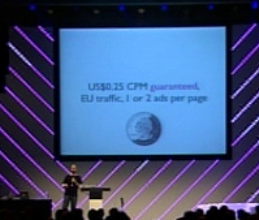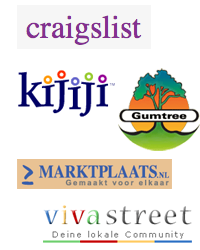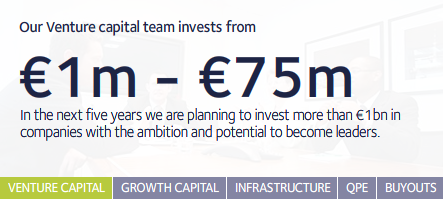 I had the chance to meet at Plugg with Gary Cige and Thibaud Elziere, the founders of ZiLok, a website where people can rent just about anything (offers and demands of rental), in their area (in a space where we should also mention RentMineOnline.com, a Seedcamp finalist, more focused on the house and appartment rentals). ZiLok will also be on stage at TheNextWeb, and they are certainly one very promising startup .
I had the chance to meet at Plugg with Gary Cige and Thibaud Elziere, the founders of ZiLok, a website where people can rent just about anything (offers and demands of rental), in their area (in a space where we should also mention RentMineOnline.com, a Seedcamp finalist, more focused on the house and appartment rentals). ZiLok will also be on stage at TheNextWeb, and they are certainly one very promising startup .
Thibaud Elziere (who has also founded photo trading platform Fotolia.com, and is seen in the picture below) answered some of my questions.
What elements (technical, marketing, luck ?) played an important role during your launch phase (first 3 months) ? What lessons / advice would you share with entrepreneurs ?
In our opinion, we are still in a launch/preparation phase, at least for the next few months. Our web background and experience helped us a lot to deal with the practical and technical aspects of the launch, so we have enough time and resources to focus on what we really want to achieve, on the big picture.
We have enjoyed a very wide press coverage since the beginning, and the main TV channels, radios and newspapers already covered Zilok. It shows that the concept itself is very “communicative”: people are interested, they get involved, and journalists and media professionals have great material to create compelling stories. Nowadays, it is not that complicated to create a new web service, as technical issues get easier to overcome. Getting visibility and building a community is where the real challenge is, and you really have to focus on communication and marketing to be sure that your wonderful service will be discovered… An easy-to-explain concept is a very good point for your business, you must never forget that! Maintaining a clear, simple and powerful vision and mission statement throughout the development and launch phases is crucial in my opinion. Marketing is also a very important part to reach some visibility. We have been working on this since the beginning, and in the following week, we will roll it out to the next level. Stay tuned!
really have to focus on communication and marketing to be sure that your wonderful service will be discovered… An easy-to-explain concept is a very good point for your business, you must never forget that! Maintaining a clear, simple and powerful vision and mission statement throughout the development and launch phases is crucial in my opinion. Marketing is also a very important part to reach some visibility. We have been working on this since the beginning, and in the following week, we will roll it out to the next level. Stay tuned!
Can you tell us more about the Business and Consumer orientations of the site ?
With Zilok we focus on both C2C and B2C markets. The B2C market corresponds to the existing rental industry, rental businesses to consumers. This already existing market is an opportunity for us to reach critical mass quickly. Critical mass is always an important issue for marketplaces and internet services, and in our case this critical mass is large since our service is locally based, which means that we must list a critical number of rental items in any local area. The Professional rental market will play a big role in overcoming this challenge.
Peer-to-peer renting, that is the C2C market, is something new that we would like to support and develop. It is the most fun part of our business model but is also the trickiest. We have to evangelize people, and it will take some time even though our first months have been very promising. We already get hundreds of rental listings a day posted by individuals, people.
You are aiming internationally very soon, opening the US, and other national markets. What is your rationale for doing so ?
Six months after opening up Zilok in its beta version, we are already operating in four countries with websites in three languages. We were able to do so because we have been aiming and designing internationally since the beginning. Zilok is offering people a new way of consuming, responding to today’s trends and concerns (scarcity of resources, availability of information, cost of storage, environment). These concerns are shared by people all over the world. That’s the first rationale: the vision and value proposition for Zilok is valid identically in every country we approach.
If you adopt an effective and realistic approach to your international organization, you can do that very early in your development, and we have done just that.
Now, in the business of marketplaces, size matters, and timing is a key factor. That’s eBay 101. Conversations are now global, especially between entrepreneurs and the tech savvy. A local success story related in any country will inspire dozens of similar businesses in the matter of weeks, all over the world. We eventually want to own our success, as far we can reach.
From what I can tell, we have here a focused entrepreneur, driving his startup in a way that changes the rules of the game of a very large (and fragmented) sector. When I see this, I can’t help but recall what a VC such as Danny Rimer from Index Ventures was telling Business 2.0 about why he loves European startups :
[…] the innovations that do arise in Europe tend to be paradigm-shifting, industry-upending, world-changing stuff. Think of Linux. Think of Skype. Hell, think of the Web itself.
Let’s now watch the space for online rental.





 really have to focus on communication and marketing to be sure that your wonderful service will be discovered… An easy-to-explain concept is a very good point for your business, you must never forget that! Maintaining a clear, simple and powerful vision and mission statement throughout the development and launch phases is crucial in my opinion. Marketing is also a very important part to reach some visibility. We have been working on this since the beginning, and in the following week, we will roll it out to the next level. Stay tuned!
really have to focus on communication and marketing to be sure that your wonderful service will be discovered… An easy-to-explain concept is a very good point for your business, you must never forget that! Maintaining a clear, simple and powerful vision and mission statement throughout the development and launch phases is crucial in my opinion. Marketing is also a very important part to reach some visibility. We have been working on this since the beginning, and in the following week, we will roll it out to the next level. Stay tuned! 


 Update : the Google gDay was first, because of Australia were early risers to April 1st. Using this gDay feature should have allowed us to foresee Google HQ
Update : the Google gDay was first, because of Australia were early risers to April 1st. Using this gDay feature should have allowed us to foresee Google HQ  Craigslist was virtually unknown in Europe besides expat circles. Maybe that international opportunity is why eBay went on a shopping spree, and bought dutch classifieds site
Craigslist was virtually unknown in Europe besides expat circles. Maybe that international opportunity is why eBay went on a shopping spree, and bought dutch classifieds site 

 Join our LinkedIn group !
Join our LinkedIn group !






Startup competition lineup at TheNextWeb conference
Published March 27, 2008 Event , startups 3 CommentsTags: andunite, beezbox, bemba, cocomment, confnetwork, ebuddy, empressr, favorit, fleck, goojet, hoera, introniche, lookery, netlog, radionomy, symbaloo, thenextweb, twingly, ubervu, wakoopa, wauw.fm, webnode, zilok
An important part of the event will be the startup competition : 24 companies presenting themselves in 5 minutes (that will be 300 seconds sharp). Currently, 22 companies are known, the last 2 will be choosen by the community early next week. Let’s have a short look at some of these startups (in alphabetical order) :
So it looks like it will be a hot and contrasted show among all those startups, demonstrating that the European web 2.0 scene is alive and kicking. We will profile some of them in more detail.
And also wait anxiously for the last 2 candidates…